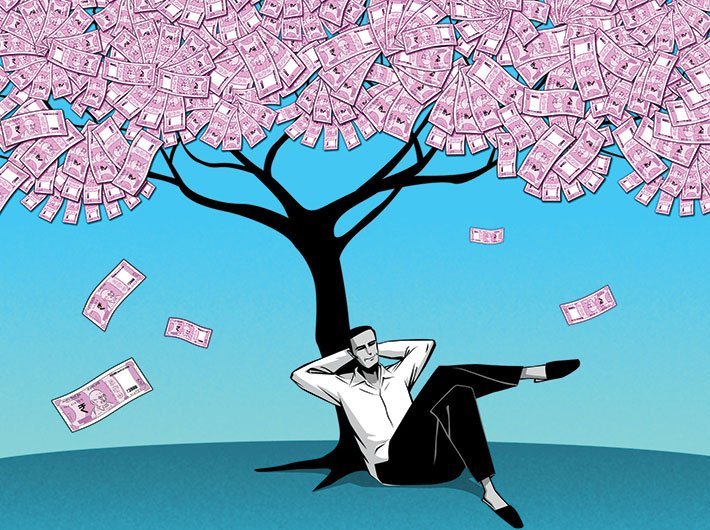The unwieldy subsidy regime can be done away with and the savings thus made can be directly passed on to the needy in the form of cash
Universal basic income (UBI) has been the buzz in policy circles since global downturn. Arvind Subramanian, former chief economic adviser to the finance ministry, championed the idea and devoted a full chapter to it in the Economic Survey of 2016-17. UBI is considered the mother of all social welfare schemes, and curiously it has supports on either side of the left-right ideological divide (though also critics on both sides).
In essence, UBI promises a fixed amount of income to one and all. Why one and all (universal)? Because fixing any parameter and identifying beneficiaries may lead to imperfections, though many votaries are open to fixing a criterion like those below the poverty line, or to all minus the taxpayers. (In today's political scene, it could be all farmers - like Telangana model at large, see page 30, and outdo oothe calls of loan waivers.) Why give away money? Because it will not stay idle in the hands of the recipient, he or she will go and spend it, presumably on necessities, and this spending will keep the economy moving. How to fund it? Now, that’s the big question.
Think
UBI, or giving fixed amount of income to every adult, is the ultimate safety net championed by the left and the right
. . .
The unwieldy subsidy regime can be done away with and the savings thus made can be directly passed on to the needy in the form of cash
Those championing it from the right-wing of economic thinking favour doing away with all subsidies, from PDS to fertilizer which all involve a lot of leaking, and instead give cash handouts to the needy. They use the concept of UBI to argue for dismantling the messy and inefficient subsidy regime. Those on the left favour the UBI as all-weather safety net, especially for the marginal sections who crisscros the poverty line through cycles of boom and bust. Some of them also favour doing away with all subsidies and giving hard cash straight to the neerdy.
In precise numbers, the case is well presented by economist Vijay Joshi of Oxford. As summarized in our cover story of February 1-15, 2017, it goes thus: If the universal basic income is Rs 17,500 a year per household (five members), it would cost 3.5 percent of GDP. Now, look at subsidies. A 2003 study by the National Institute of Public Finance and Policy (NIPFP) found that ‘non-merit subsidies’ were 7.7 percent in 1998-99. (‘Non-merit’ subsidies exclude ‘merit’ subsidies, meaning schemes relating to education, health, nutrition, environment, rural development, roads and bridges and urban development.) Ending even half of the non-merit subsidies will get enough funds to launch UBI.
But ending the subsidies is difficult. Politicians think they will lose votes if cheap, rationed food grains or subsidised fertiliser are stopped. No matter what you may give to them instaed.
However, there are other options to generate funds. Joshi mentions PSU privatisation and taxing agricultural income (see Page14). Also think of all the indirect tax breaks to the corporate sector in every budget, justified only in the name of helping companies create jobs. Apparently, they are not creating enough jobs. Ending those tax breaks will be a cheaper option, politically speaking, to get enough money to launch UBI. Then, there’s the controversy about the government eyeing the central bank’s reserve funds… consider that also as an option.
UBI is the kind of move that will grant long legacy to any prime minister. It will be a sure game-changer in any election.
Reality check
UBI requires intricate planning, especially in deciding the range of beneficiaries. If it is to be funded by removing existing subsidies, it will be one of the boldest decisions in India’s history. If subsidies are not touched, its math becomes unmanageable. A limited version, however, is feasible and – who knows – may be round the corner.
(This article appears in January 15, 2019 edition)



